Research Paper on Curriculum Conceptions, Models, and Online Learning
VerifiedAdded on 2023/06/05
|7
|1867
|81
Report
AI Summary
This research paper explores various philosophical lenses used to define curriculum conceptions, focusing on social reconstruction, cognitive processes, academic, technology, and humanistic approaches. The paper articulates the philosophical underpinnings of these conceptualizations, framing arguments within the demands of online curriculums and their relatability to address the needs of online learners. It describes five teaching models according to Joyce, Weil, and Calhoun, analyzing their efficacy within the context of online learning. The paper also examines the role of technology in online education, particularly its impact on the development of student learning and the importance of aligning teaching methods with curriculum goals. The conclusion emphasizes the significance of understanding different curriculum definitions and the effective integration of teaching models to enhance the online learning experience. References include relevant academic sources to support the arguments and findings.
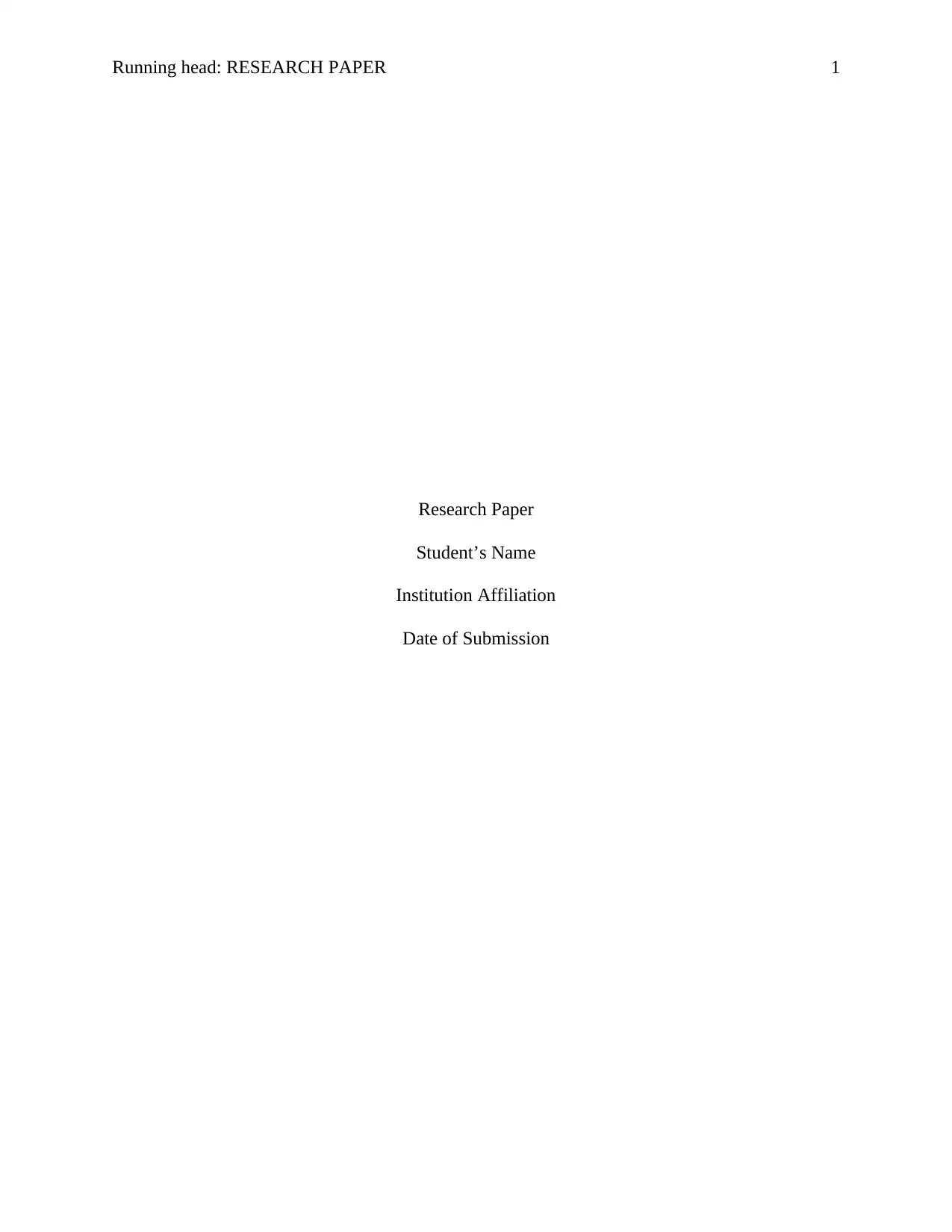
Running head: RESEARCH PAPER 1
Research Paper
Student’s Name
Institution Affiliation
Date of Submission
Research Paper
Student’s Name
Institution Affiliation
Date of Submission
Paraphrase This Document
Need a fresh take? Get an instant paraphrase of this document with our AI Paraphraser
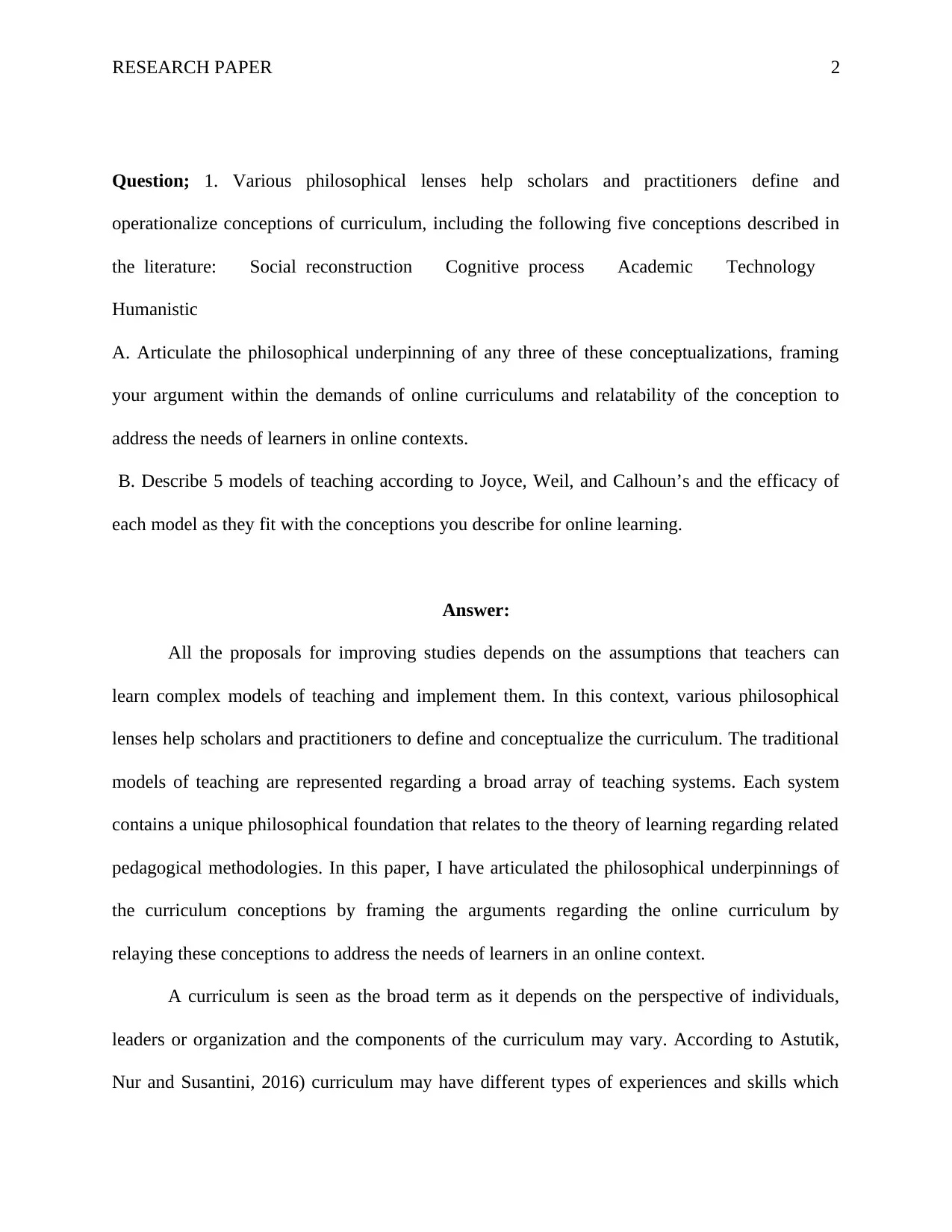
RESEARCH PAPER 2
Question; 1. Various philosophical lenses help scholars and practitioners define and
operationalize conceptions of curriculum, including the following five conceptions described in
the literature: Social reconstruction Cognitive process Academic Technology
Humanistic
A. Articulate the philosophical underpinning of any three of these conceptualizations, framing
your argument within the demands of online curriculums and relatability of the conception to
address the needs of learners in online contexts.
B. Describe 5 models of teaching according to Joyce, Weil, and Calhoun’s and the efficacy of
each model as they fit with the conceptions you describe for online learning.
Answer:
All the proposals for improving studies depends on the assumptions that teachers can
learn complex models of teaching and implement them. In this context, various philosophical
lenses help scholars and practitioners to define and conceptualize the curriculum. The traditional
models of teaching are represented regarding a broad array of teaching systems. Each system
contains a unique philosophical foundation that relates to the theory of learning regarding related
pedagogical methodologies. In this paper, I have articulated the philosophical underpinnings of
the curriculum conceptions by framing the arguments regarding the online curriculum by
relaying these conceptions to address the needs of learners in an online context.
A curriculum is seen as the broad term as it depends on the perspective of individuals,
leaders or organization and the components of the curriculum may vary. According to Astutik,
Nur and Susantini, 2016) curriculum may have different types of experiences and skills which
Question; 1. Various philosophical lenses help scholars and practitioners define and
operationalize conceptions of curriculum, including the following five conceptions described in
the literature: Social reconstruction Cognitive process Academic Technology
Humanistic
A. Articulate the philosophical underpinning of any three of these conceptualizations, framing
your argument within the demands of online curriculums and relatability of the conception to
address the needs of learners in online contexts.
B. Describe 5 models of teaching according to Joyce, Weil, and Calhoun’s and the efficacy of
each model as they fit with the conceptions you describe for online learning.
Answer:
All the proposals for improving studies depends on the assumptions that teachers can
learn complex models of teaching and implement them. In this context, various philosophical
lenses help scholars and practitioners to define and conceptualize the curriculum. The traditional
models of teaching are represented regarding a broad array of teaching systems. Each system
contains a unique philosophical foundation that relates to the theory of learning regarding related
pedagogical methodologies. In this paper, I have articulated the philosophical underpinnings of
the curriculum conceptions by framing the arguments regarding the online curriculum by
relaying these conceptions to address the needs of learners in an online context.
A curriculum is seen as the broad term as it depends on the perspective of individuals,
leaders or organization and the components of the curriculum may vary. According to Astutik,
Nur and Susantini, 2016) curriculum may have different types of experiences and skills which
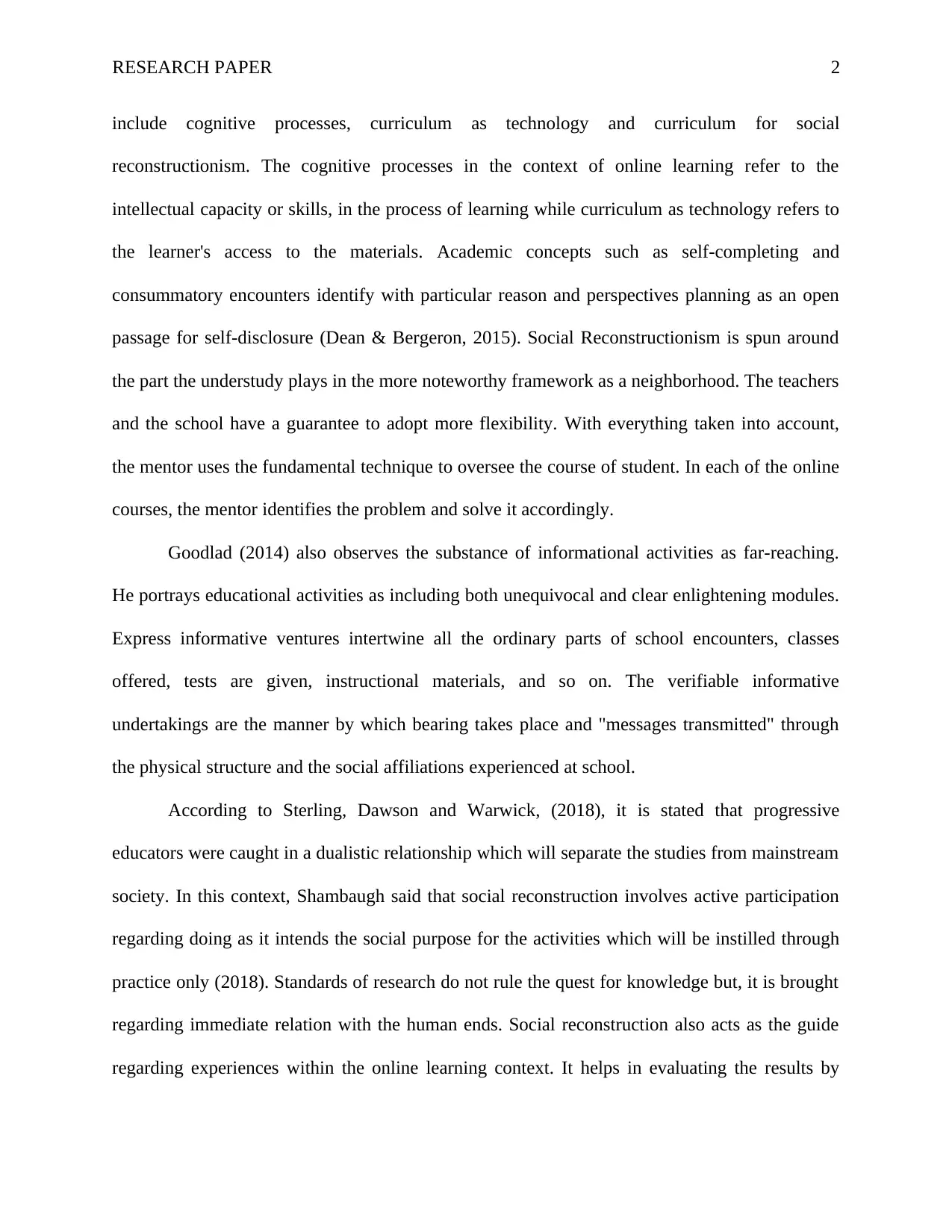
RESEARCH PAPER 2
include cognitive processes, curriculum as technology and curriculum for social
reconstructionism. The cognitive processes in the context of online learning refer to the
intellectual capacity or skills, in the process of learning while curriculum as technology refers to
the learner's access to the materials. Academic concepts such as self-completing and
consummatory encounters identify with particular reason and perspectives planning as an open
passage for self-disclosure (Dean & Bergeron, 2015). Social Reconstructionism is spun around
the part the understudy plays in the more noteworthy framework as a neighborhood. The teachers
and the school have a guarantee to adopt more flexibility. With everything taken into account,
the mentor uses the fundamental technique to oversee the course of student. In each of the online
courses, the mentor identifies the problem and solve it accordingly.
Goodlad (2014) also observes the substance of informational activities as far-reaching.
He portrays educational activities as including both unequivocal and clear enlightening modules.
Express informative ventures intertwine all the ordinary parts of school encounters, classes
offered, tests are given, instructional materials, and so on. The verifiable informative
undertakings are the manner by which bearing takes place and "messages transmitted" through
the physical structure and the social affiliations experienced at school.
According to Sterling, Dawson and Warwick, (2018), it is stated that progressive
educators were caught in a dualistic relationship which will separate the studies from mainstream
society. In this context, Shambaugh said that social reconstruction involves active participation
regarding doing as it intends the social purpose for the activities which will be instilled through
practice only (2018). Standards of research do not rule the quest for knowledge but, it is brought
regarding immediate relation with the human ends. Social reconstruction also acts as the guide
regarding experiences within the online learning context. It helps in evaluating the results by
include cognitive processes, curriculum as technology and curriculum for social
reconstructionism. The cognitive processes in the context of online learning refer to the
intellectual capacity or skills, in the process of learning while curriculum as technology refers to
the learner's access to the materials. Academic concepts such as self-completing and
consummatory encounters identify with particular reason and perspectives planning as an open
passage for self-disclosure (Dean & Bergeron, 2015). Social Reconstructionism is spun around
the part the understudy plays in the more noteworthy framework as a neighborhood. The teachers
and the school have a guarantee to adopt more flexibility. With everything taken into account,
the mentor uses the fundamental technique to oversee the course of student. In each of the online
courses, the mentor identifies the problem and solve it accordingly.
Goodlad (2014) also observes the substance of informational activities as far-reaching.
He portrays educational activities as including both unequivocal and clear enlightening modules.
Express informative ventures intertwine all the ordinary parts of school encounters, classes
offered, tests are given, instructional materials, and so on. The verifiable informative
undertakings are the manner by which bearing takes place and "messages transmitted" through
the physical structure and the social affiliations experienced at school.
According to Sterling, Dawson and Warwick, (2018), it is stated that progressive
educators were caught in a dualistic relationship which will separate the studies from mainstream
society. In this context, Shambaugh said that social reconstruction involves active participation
regarding doing as it intends the social purpose for the activities which will be instilled through
practice only (2018). Standards of research do not rule the quest for knowledge but, it is brought
regarding immediate relation with the human ends. Social reconstruction also acts as the guide
regarding experiences within the online learning context. It helps in evaluating the results by
⊘ This is a preview!⊘
Do you want full access?
Subscribe today to unlock all pages.

Trusted by 1+ million students worldwide
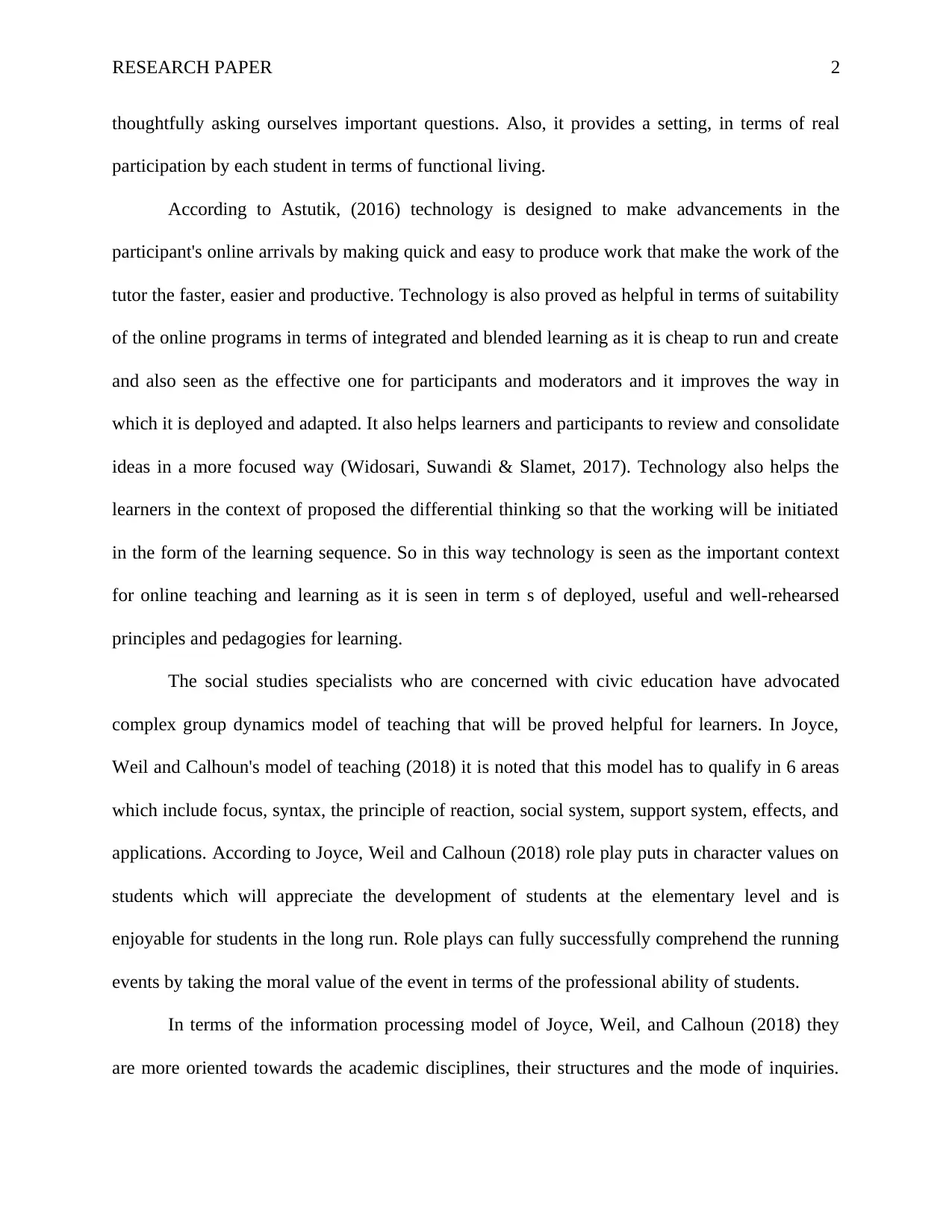
RESEARCH PAPER 2
thoughtfully asking ourselves important questions. Also, it provides a setting, in terms of real
participation by each student in terms of functional living.
According to Astutik, (2016) technology is designed to make advancements in the
participant's online arrivals by making quick and easy to produce work that make the work of the
tutor the faster, easier and productive. Technology is also proved as helpful in terms of suitability
of the online programs in terms of integrated and blended learning as it is cheap to run and create
and also seen as the effective one for participants and moderators and it improves the way in
which it is deployed and adapted. It also helps learners and participants to review and consolidate
ideas in a more focused way (Widosari, Suwandi & Slamet, 2017). Technology also helps the
learners in the context of proposed the differential thinking so that the working will be initiated
in the form of the learning sequence. So in this way technology is seen as the important context
for online teaching and learning as it is seen in term s of deployed, useful and well-rehearsed
principles and pedagogies for learning.
The social studies specialists who are concerned with civic education have advocated
complex group dynamics model of teaching that will be proved helpful for learners. In Joyce,
Weil and Calhoun's model of teaching (2018) it is noted that this model has to qualify in 6 areas
which include focus, syntax, the principle of reaction, social system, support system, effects, and
applications. According to Joyce, Weil and Calhoun (2018) role play puts in character values on
students which will appreciate the development of students at the elementary level and is
enjoyable for students in the long run. Role plays can fully successfully comprehend the running
events by taking the moral value of the event in terms of the professional ability of students.
In terms of the information processing model of Joyce, Weil, and Calhoun (2018) they
are more oriented towards the academic disciplines, their structures and the mode of inquiries.
thoughtfully asking ourselves important questions. Also, it provides a setting, in terms of real
participation by each student in terms of functional living.
According to Astutik, (2016) technology is designed to make advancements in the
participant's online arrivals by making quick and easy to produce work that make the work of the
tutor the faster, easier and productive. Technology is also proved as helpful in terms of suitability
of the online programs in terms of integrated and blended learning as it is cheap to run and create
and also seen as the effective one for participants and moderators and it improves the way in
which it is deployed and adapted. It also helps learners and participants to review and consolidate
ideas in a more focused way (Widosari, Suwandi & Slamet, 2017). Technology also helps the
learners in the context of proposed the differential thinking so that the working will be initiated
in the form of the learning sequence. So in this way technology is seen as the important context
for online teaching and learning as it is seen in term s of deployed, useful and well-rehearsed
principles and pedagogies for learning.
The social studies specialists who are concerned with civic education have advocated
complex group dynamics model of teaching that will be proved helpful for learners. In Joyce,
Weil and Calhoun's model of teaching (2018) it is noted that this model has to qualify in 6 areas
which include focus, syntax, the principle of reaction, social system, support system, effects, and
applications. According to Joyce, Weil and Calhoun (2018) role play puts in character values on
students which will appreciate the development of students at the elementary level and is
enjoyable for students in the long run. Role plays can fully successfully comprehend the running
events by taking the moral value of the event in terms of the professional ability of students.
In terms of the information processing model of Joyce, Weil, and Calhoun (2018) they
are more oriented towards the academic disciplines, their structures and the mode of inquiries.
Paraphrase This Document
Need a fresh take? Get an instant paraphrase of this document with our AI Paraphraser
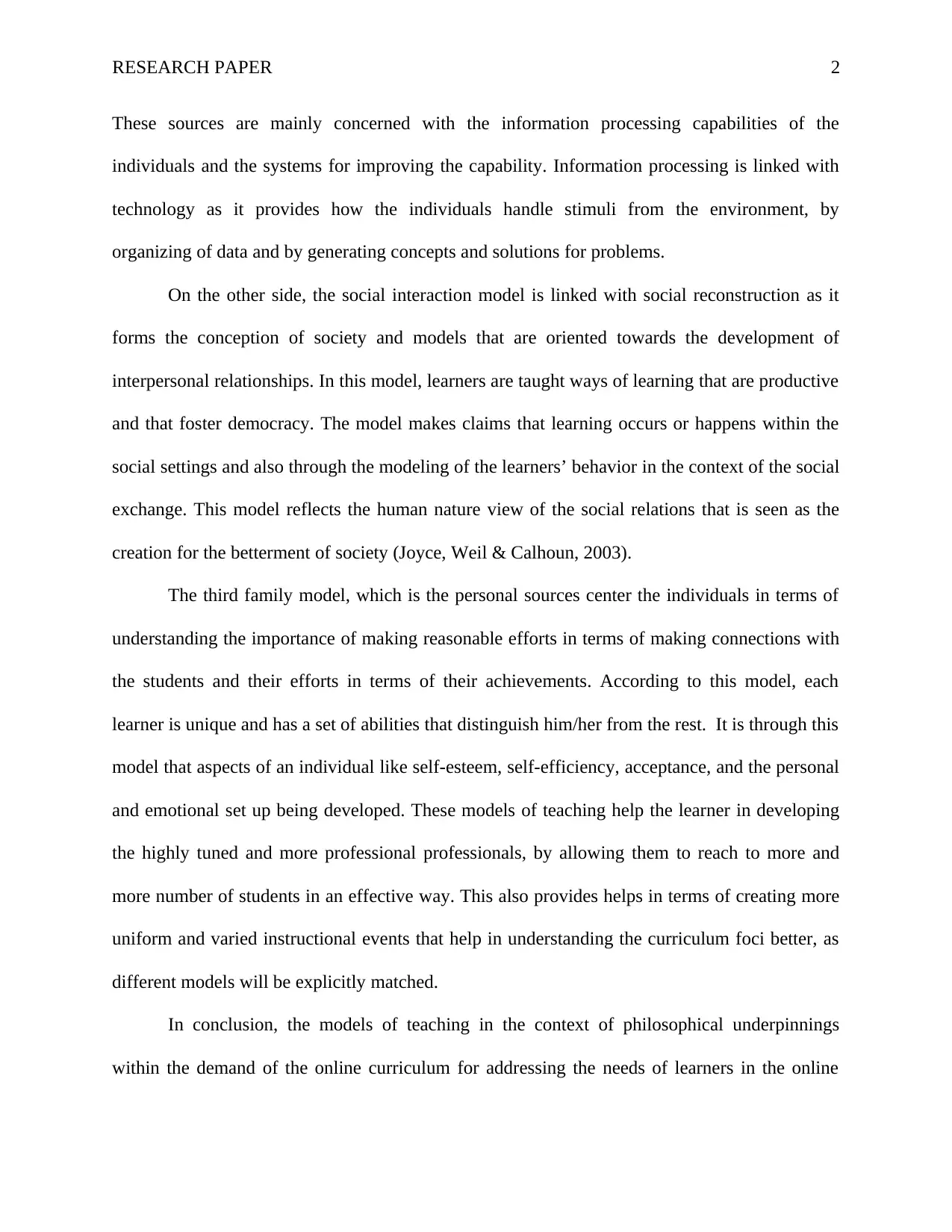
RESEARCH PAPER 2
These sources are mainly concerned with the information processing capabilities of the
individuals and the systems for improving the capability. Information processing is linked with
technology as it provides how the individuals handle stimuli from the environment, by
organizing of data and by generating concepts and solutions for problems.
On the other side, the social interaction model is linked with social reconstruction as it
forms the conception of society and models that are oriented towards the development of
interpersonal relationships. In this model, learners are taught ways of learning that are productive
and that foster democracy. The model makes claims that learning occurs or happens within the
social settings and also through the modeling of the learners’ behavior in the context of the social
exchange. This model reflects the human nature view of the social relations that is seen as the
creation for the betterment of society (Joyce, Weil & Calhoun, 2003).
The third family model, which is the personal sources center the individuals in terms of
understanding the importance of making reasonable efforts in terms of making connections with
the students and their efforts in terms of their achievements. According to this model, each
learner is unique and has a set of abilities that distinguish him/her from the rest. It is through this
model that aspects of an individual like self-esteem, self-efficiency, acceptance, and the personal
and emotional set up being developed. These models of teaching help the learner in developing
the highly tuned and more professional professionals, by allowing them to reach to more and
more number of students in an effective way. This also provides helps in terms of creating more
uniform and varied instructional events that help in understanding the curriculum foci better, as
different models will be explicitly matched.
In conclusion, the models of teaching in the context of philosophical underpinnings
within the demand of the online curriculum for addressing the needs of learners in the online
These sources are mainly concerned with the information processing capabilities of the
individuals and the systems for improving the capability. Information processing is linked with
technology as it provides how the individuals handle stimuli from the environment, by
organizing of data and by generating concepts and solutions for problems.
On the other side, the social interaction model is linked with social reconstruction as it
forms the conception of society and models that are oriented towards the development of
interpersonal relationships. In this model, learners are taught ways of learning that are productive
and that foster democracy. The model makes claims that learning occurs or happens within the
social settings and also through the modeling of the learners’ behavior in the context of the social
exchange. This model reflects the human nature view of the social relations that is seen as the
creation for the betterment of society (Joyce, Weil & Calhoun, 2003).
The third family model, which is the personal sources center the individuals in terms of
understanding the importance of making reasonable efforts in terms of making connections with
the students and their efforts in terms of their achievements. According to this model, each
learner is unique and has a set of abilities that distinguish him/her from the rest. It is through this
model that aspects of an individual like self-esteem, self-efficiency, acceptance, and the personal
and emotional set up being developed. These models of teaching help the learner in developing
the highly tuned and more professional professionals, by allowing them to reach to more and
more number of students in an effective way. This also provides helps in terms of creating more
uniform and varied instructional events that help in understanding the curriculum foci better, as
different models will be explicitly matched.
In conclusion, the models of teaching in the context of philosophical underpinnings
within the demand of the online curriculum for addressing the needs of learners in the online
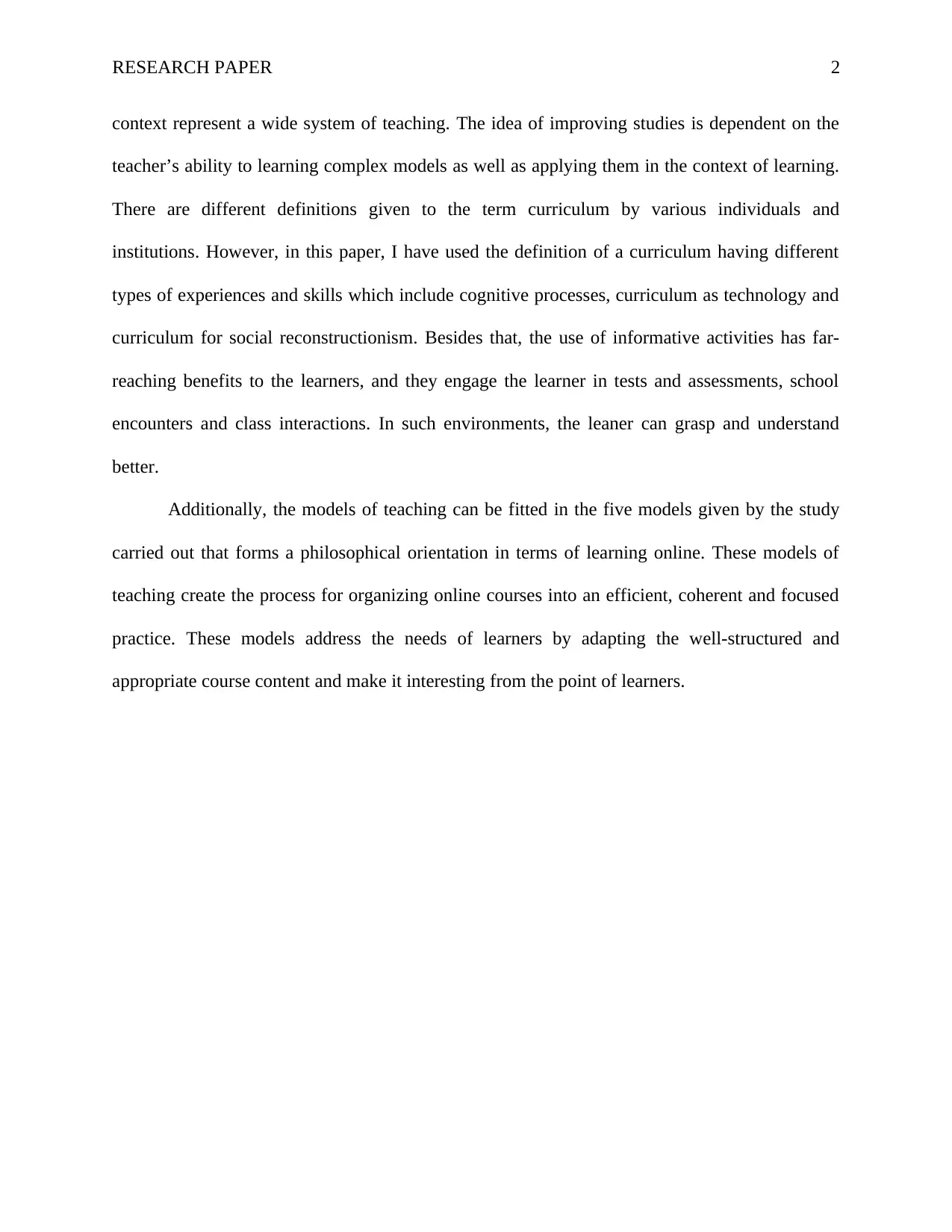
RESEARCH PAPER 2
context represent a wide system of teaching. The idea of improving studies is dependent on the
teacher’s ability to learning complex models as well as applying them in the context of learning.
There are different definitions given to the term curriculum by various individuals and
institutions. However, in this paper, I have used the definition of a curriculum having different
types of experiences and skills which include cognitive processes, curriculum as technology and
curriculum for social reconstructionism. Besides that, the use of informative activities has far-
reaching benefits to the learners, and they engage the learner in tests and assessments, school
encounters and class interactions. In such environments, the leaner can grasp and understand
better.
Additionally, the models of teaching can be fitted in the five models given by the study
carried out that forms a philosophical orientation in terms of learning online. These models of
teaching create the process for organizing online courses into an efficient, coherent and focused
practice. These models address the needs of learners by adapting the well-structured and
appropriate course content and make it interesting from the point of learners.
context represent a wide system of teaching. The idea of improving studies is dependent on the
teacher’s ability to learning complex models as well as applying them in the context of learning.
There are different definitions given to the term curriculum by various individuals and
institutions. However, in this paper, I have used the definition of a curriculum having different
types of experiences and skills which include cognitive processes, curriculum as technology and
curriculum for social reconstructionism. Besides that, the use of informative activities has far-
reaching benefits to the learners, and they engage the learner in tests and assessments, school
encounters and class interactions. In such environments, the leaner can grasp and understand
better.
Additionally, the models of teaching can be fitted in the five models given by the study
carried out that forms a philosophical orientation in terms of learning online. These models of
teaching create the process for organizing online courses into an efficient, coherent and focused
practice. These models address the needs of learners by adapting the well-structured and
appropriate course content and make it interesting from the point of learners.
⊘ This is a preview!⊘
Do you want full access?
Subscribe today to unlock all pages.

Trusted by 1+ million students worldwide
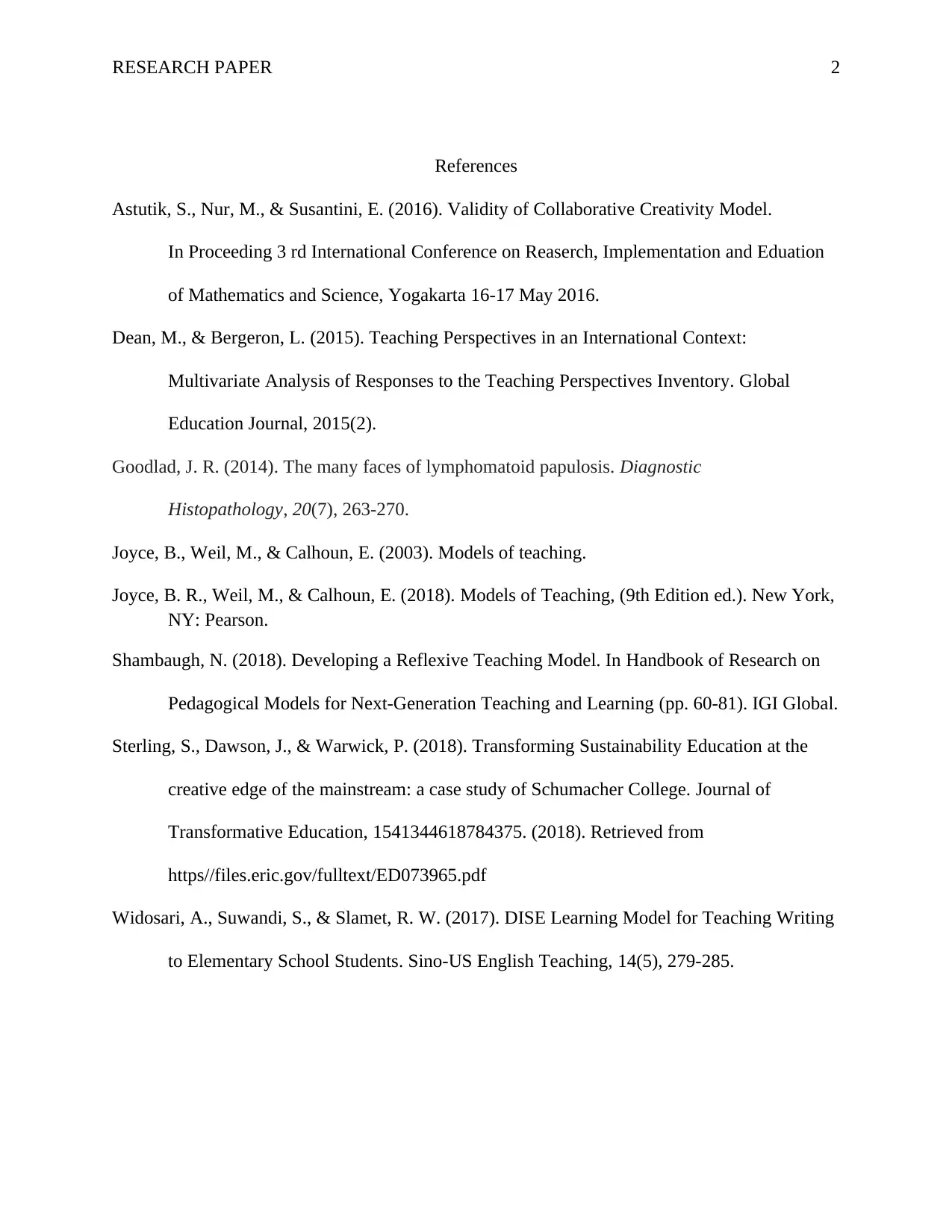
RESEARCH PAPER 2
References
Astutik, S., Nur, M., & Susantini, E. (2016). Validity of Collaborative Creativity Model.
In Proceeding 3 rd International Conference on Reaserch, Implementation and Eduation
of Mathematics and Science, Yogakarta 16-17 May 2016.
Dean, M., & Bergeron, L. (2015). Teaching Perspectives in an International Context:
Multivariate Analysis of Responses to the Teaching Perspectives Inventory. Global
Education Journal, 2015(2).
Goodlad, J. R. (2014). The many faces of lymphomatoid papulosis. Diagnostic
Histopathology, 20(7), 263-270.
Joyce, B., Weil, M., & Calhoun, E. (2003). Models of teaching.
Joyce, B. R., Weil, M., & Calhoun, E. (2018). Models of Teaching, (9th Edition ed.). New York,
NY: Pearson.
Shambaugh, N. (2018). Developing a Reflexive Teaching Model. In Handbook of Research on
Pedagogical Models for Next-Generation Teaching and Learning (pp. 60-81). IGI Global.
Sterling, S., Dawson, J., & Warwick, P. (2018). Transforming Sustainability Education at the
creative edge of the mainstream: a case study of Schumacher College. Journal of
Transformative Education, 1541344618784375. (2018). Retrieved from
https//files.eric.gov/fulltext/ED073965.pdf
Widosari, A., Suwandi, S., & Slamet, R. W. (2017). DISE Learning Model for Teaching Writing
to Elementary School Students. Sino-US English Teaching, 14(5), 279-285.
References
Astutik, S., Nur, M., & Susantini, E. (2016). Validity of Collaborative Creativity Model.
In Proceeding 3 rd International Conference on Reaserch, Implementation and Eduation
of Mathematics and Science, Yogakarta 16-17 May 2016.
Dean, M., & Bergeron, L. (2015). Teaching Perspectives in an International Context:
Multivariate Analysis of Responses to the Teaching Perspectives Inventory. Global
Education Journal, 2015(2).
Goodlad, J. R. (2014). The many faces of lymphomatoid papulosis. Diagnostic
Histopathology, 20(7), 263-270.
Joyce, B., Weil, M., & Calhoun, E. (2003). Models of teaching.
Joyce, B. R., Weil, M., & Calhoun, E. (2018). Models of Teaching, (9th Edition ed.). New York,
NY: Pearson.
Shambaugh, N. (2018). Developing a Reflexive Teaching Model. In Handbook of Research on
Pedagogical Models for Next-Generation Teaching and Learning (pp. 60-81). IGI Global.
Sterling, S., Dawson, J., & Warwick, P. (2018). Transforming Sustainability Education at the
creative edge of the mainstream: a case study of Schumacher College. Journal of
Transformative Education, 1541344618784375. (2018). Retrieved from
https//files.eric.gov/fulltext/ED073965.pdf
Widosari, A., Suwandi, S., & Slamet, R. W. (2017). DISE Learning Model for Teaching Writing
to Elementary School Students. Sino-US English Teaching, 14(5), 279-285.
1 out of 7
Your All-in-One AI-Powered Toolkit for Academic Success.
+13062052269
info@desklib.com
Available 24*7 on WhatsApp / Email
![[object Object]](/_next/static/media/star-bottom.7253800d.svg)
Unlock your academic potential
Copyright © 2020–2026 A2Z Services. All Rights Reserved. Developed and managed by ZUCOL.


